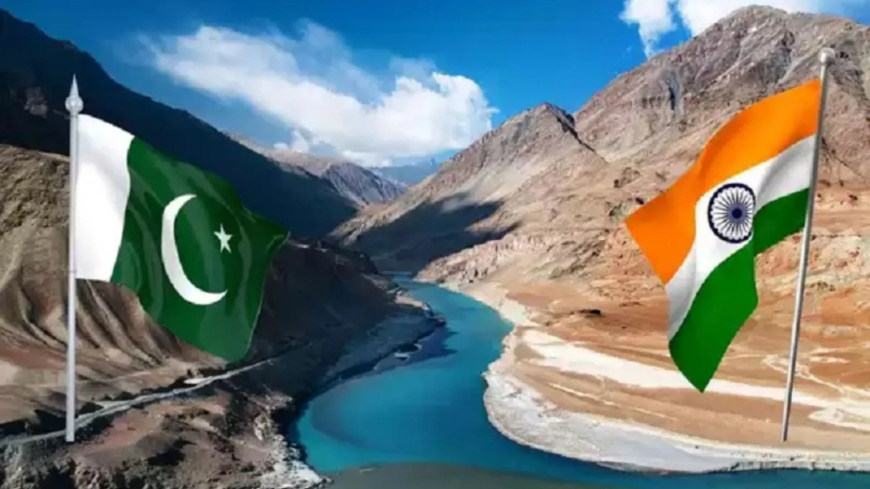India Puts a Pause on Indus River Agreement: What It Means for Pakistan and for India Too
India has paused the Indus river deal it made with Pakistan many years ago. Here's what this big step could mean for both countries and how it might affect water sharing and future peace talks.

Introduction
-
India has pressed the pause button on one of the most important water-sharing agreements with Pakistan — the Indus Waters Treaty.
-
This agreement, which has been in place for over 60 years, has now reached a turning point.
-
India’s decision could bring major changes not just for Pakistan but for India too.
-
Let's break it down step-by-step to understand what this move means, how it may affect both countries, and what the future might hold.
1. What Is the Indus Waters Treaty?
-
The Indus Waters Treaty was signed way back in 1960 between India and Pakistan, with help from the World Bank.
-
It’s a deal about how the two countries would divide the use of rivers that flow through both nations.
-
According to the agreement:
-
Pakistan got control of the three western rivers — Indus, Jhelum, and Chenab.
-
India was allowed to use the three eastern rivers — Ravi, Beas, and Sutlej.
-
-
Even during wars and fights, this treaty survived — which made it one of the most successful peace-time deals between the two countries.
2. Why Did India Decide to Pause the Deal Now?
-
India has said that Pakistan has been unfair and uncooperative about the treaty rules in recent years.
-
Disagreements have grown, especially around hydroelectric projects that India is building on rivers Pakistan claims it should have more say over.
-
India also feels that Pakistan takes the matter to international bodies too quickly, instead of solving issues bilaterally.
-
Recently, India sent a notice to Pakistan, saying it wants to change some parts of the deal or even possibly end it altogether.
3. The Main Point of Conflict: Water Projects
-
India is building several hydroelectric power plants in Jammu and Kashmir — like Kishanganga and Ratle.
-
Pakistan says these projects could cut down the flow of water it receives from the rivers.
-
India claims these projects follow the rules and are within its rights as per the original agreement.
-
Both sides have had multiple meetings and arguments, but no final solution has come up.
4. What This Means for Pakistan
-
Pakistan is a country that deeply depends on these rivers for drinking water, farming, and electricity.
-
Most of Pakistan’s crops and agriculture depend on the Indus River system.
-
If India decides to cut down or slow the water flow, Pakistan could face:
-
Water shortage
-
Reduced farming output
-
Hydropower issues
-
-
There’s also a fear of droughts and climate-related problems getting worse.
5. And What It Means for India
-
India may gain more control over its water resources in the north.
-
The country could use the water for:
-
Generating power
-
Irrigation
-
Meeting growing needs in states like Punjab and Jammu & Kashmir
-
-
But the flip side is:
-
It could raise tensions with Pakistan
-
The global community may criticize India’s decision
-
It might impact future talks and trade relations
-
6. Global Reaction So Far
-
The World Bank, which helped make the original treaty, has urged both nations to solve this peacefully.
-
Neighboring countries and global leaders are watching closely.
-
Experts say water-related issues could become the next big reason for conflict between countries in Asia.
7. Can the Treaty Be Fixed or Changed?
-
India has asked to talk about the terms again — a process called modifying the treaty.
-
For that to happen, both countries need to agree on starting formal talks.
-
If not, India may decide to leave the agreement altogether, though that’s a rare and serious step.
-
Some experts suggest that a middle path should be found — like updated rules or new timelines for projects.
8. A Look at the Bigger Picture
-
Water is becoming a rare and precious resource, especially in South Asia where populations are growing fast.
-
Both India and Pakistan face climate challenges, like less rain and melting glaciers.
-
This makes water security even more important than before.
-
Any move that affects rivers can have long-term environmental, social, and political impacts.
9. What Should Happen Next?
-
Experts say the two countries need to:
-
Sit down and talk directly
-
Avoid turning this into a political issue
-
Involve climate and river experts in discussions
-
Think of future generations before making drastic decisions
-
-
A peaceful solution is still possible if both sides show patience and cooperation.
10. Final Thoughts
-
India’s decision to pause the Indus water deal is a big move — one that could change the relationship between the two neighbors.
-
For Pakistan, it means uncertainty over its water supply.
-
For India, it means more control but also more responsibility.
-
The hope is that both sides will come together, talk it out, and find a fair and peaceful solution that works in the long run.
In Summary:
-
India has put a hold on a long-standing water-sharing deal with Pakistan.
-
This could affect millions of lives on both sides of the border.
-
It’s a reminder that water is power, and that sharing it wisely is more important than ever.
-
Whether this leads to tension or cooperation now depends on the actions both countries take next.
Thanks for reading! Follow us for more updates on international agreements, diplomacy, and water resource news.
Would you like a social media version of this post or image suggestions for your blog?
What's Your Reaction?


























































